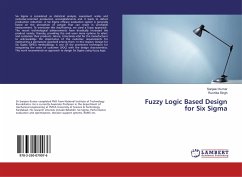
Fuzzy Logic Based Design for Six Sigma
Versandkostenfrei!
Versandfertig in 6-10 Tagen
24,99 €
inkl. MwSt.

PAYBACK Punkte
12 °P sammeln!
Six Sigma is considered as statistical analysis, assessment scales and customer-oriented production accomplishments and it leads to defect production reduction. A Six Sigma efficacy evaluation system is generally based on the perception of people that can result in unreliable measurement. To overcome this insufficiency, we used a fuzzy approach. The recent technological advancements have drastically increased the product variety, thereby, providing the end users more options to select and customize their products. Hence, it becomes vital for the manufacturer to acknowledge the importance of th...
Six Sigma is considered as statistical analysis, assessment scales and customer-oriented production accomplishments and it leads to defect production reduction. A Six Sigma efficacy evaluation system is generally based on the perception of people that can result in unreliable measurement. To overcome this insufficiency, we used a fuzzy approach. The recent technological advancements have drastically increased the product variety, thereby, providing the end users more options to select and customize their products. Hence, it becomes vital for the manufacturer to acknowledge the importance of the customer requirements for maintaining a permanent goodwill among them. In this respect, Design for Six Sigma (DFSS) methodology is one of the prominent techniques for integrating the voice of customer (VOC) with the design characteristics. This work recommends an approach to design Six Sigma using fuzzy logic.












